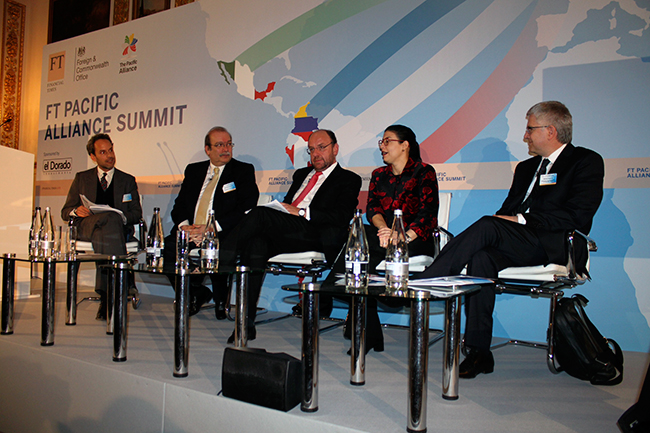December 10th, 2013
THE SCOPE OF THE PACIFIC ALLIANCE IS DISCUSSED IN THE UNITED KINGDOM

London, England, December 10th, 2013. Vanessa Rubio Marquez, the undersecretary for the Mexican Secretary of External Relations’ Latin American and Caribbean branch took part in a seminar in the capital regarding the Pacific Alliance, taking the opportunity to present the potential of the rising Latin American block, in particularly concerning investment, business and economic development.
As a representative of the Mexican government, the secretary spoke of the open and inclusive character of the Pacific Alliance – a body made up of Mexico, Chile, Colombia and Peru – and its objectives of creating a free market space for goods, services, people and capital whilst forging closer relations with the Asian-Pacific basin.
The event was organized by both the British Foreign Commonwealth Office (FCO) and The Financial Times. Rubio Marquez alongside representatives from the other three member states, such as Chilean foreign Minister Alfredo Moreno, formed the governmental panel titled: “Pacific Alliance; the new hub of Latin America?” through which they were able to present their ideas concerning the future role of the block on the global stage as well as pending notions on the 2014 agenda.
It was recalled that the countries integrated into the Pacific Alliance have demonstrated indicators of a sustained performance and economic stability, especially considering that as a group they represent the 8th strongest economy and the 7th in potential exports on a world level.
Later, Rubio exchanged points if view with British Foreign Secretary William Hague and with Secretary of State for External Relations and Commonwealth Affairs Hugo Swire, who offered a warm reception to the evening’s participants.
The Undersecretary emphasized that the Pacific Alliance will produce better development opportunities through focus on agreements of profound economic, commercial and cooperative integration in a region with a population of 209 million people, the majority of whom are young, representing an important source of productive human capital
Later on, a second panel took place on which leaders of the business sector exchanged ideas concerning the business environment, pointing out the opportunities and economic challenges facing the Alliance and the United Kingdom and contrasting them with other blocks and emerging markets.
The event also showed that the four countries integrated into this new mechanism contribute 36% of Latin Americas GDP, carry out 50% of world trade in the region and that last year the group received over 70,000 billion dollars in foreign investment, representing 41% of the total investment in the region.
Said nations gave the example of elimination of labour and financial barriers and in the commercial field concluded negotiations by aiming to achieve 100% tariff reduction; 92% in the immediate future and the remaining 8% in the short and medium term.

